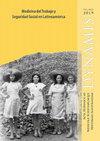Psychoanalyzing intelligence: Béla Székely’s Los Tests
IF 0.1
4区 哲学
Q3 HISTORY & PHILOSOPHY OF SCIENCE
引用次数: 0
Abstract
This paper aims to analyze the definition of intelligence that appeared in the book Los Tests (1946) written by BélaSzékely, a Hungarian psychologist who emigrated to Argentina in 1938. Although Székely’s work was mainly related to psychoanalysis and child psychology, the publication of this compilation of psychometric tests became one of his most influential works, in which he based his observations on the ideas of Wilhelm Stern, Sigmund Freud, and Alfred Adler. The methodology used in this article is based on a qualitative and interpretative analysis of bibliographical sources from the perspectives of the critical history of psychology and intellectual history in Argentina in the 1930s and 1940s. In using this approach, I analyze what other specialists thought of intelligence, in contrast to the ideas presented by Székely. The article approaches the issue first by briefly presenting the author in question, and his position within Hungarian and Argentinian intellectual groups. Then, it studies general understandings of ‘intelligence’ and ‘intellectual level’ in Argentina around the time that Székely’s book made its first appearance and, finally, it examines to what extent his viewpoint was different. The articulation between epistemological and historical discussions allows us to reflect not only on the transformations present in scientific constructs such as intelligence but also on the implications they had within the scientific community and on a wider social and political level. If intelligence was considered to be a neutral concept, then a mere compilation of tests would be enough for its dissemination. Székely’s book made an impact because it contributed to the availability of testing technology, the popularization of said technology, and the intelligence concept.智力精神分析:bela szekely的测试
本文旨在分析1938年移居阿根廷的匈牙利心理学家b laszsamkely在1946年出版的《Los Tests》一书中对智力的定义。虽然szsamuely的工作主要与精神分析和儿童心理学有关,但这本心理测试汇编的出版成为他最有影响力的作品之一,在这本书中,他基于威廉·斯特恩、西格蒙德·弗洛伊德和阿尔弗雷德·阿德勒的观点进行了观察。本文使用的方法是基于对参考文献来源的定性和解释性分析,从20世纪30年代和40年代阿根廷心理学批判史和思想史的角度出发。在使用这种方法时,我分析了其他专家对智力的看法,并与szacimkely提出的观点形成对比。文章首先简要介绍了所讨论的作者,以及他在匈牙利和阿根廷知识分子群体中的地位。然后,它研究了大约在szacimkely的书第一次出现的时候,阿根廷对“智力”和“智力水平”的一般理解,最后,它检查了他的观点在多大程度上不同。认识论和历史讨论之间的衔接使我们不仅能够反思智力等科学结构中存在的转变,而且能够反思它们在科学界以及更广泛的社会和政治层面上的影响。如果智力被认为是一个中立的概念,那么仅仅汇编测试就足以传播它。szsamuely的书产生了影响,因为它促进了测试技术的可用性,所述技术的普及和智能概念。
本文章由计算机程序翻译,如有差异,请以英文原文为准。
求助全文
约1分钟内获得全文
求助全文
来源期刊

Dynamis
社会科学-科学史与科学哲学
CiteScore
0.30
自引率
0.00%
发文量
0
审稿时长
>12 weeks
期刊介绍:
DYNAMIS is an international journal devoted to the history of medicine, health and science, founded in 1981, that pays special attention to novel and interdisciplinary historiographic perspectives. It offers original, double peer-reviewed research studies (articles, notes or documents) and reviews in languages of the European Union.
 求助内容:
求助内容: 应助结果提醒方式:
应助结果提醒方式:


